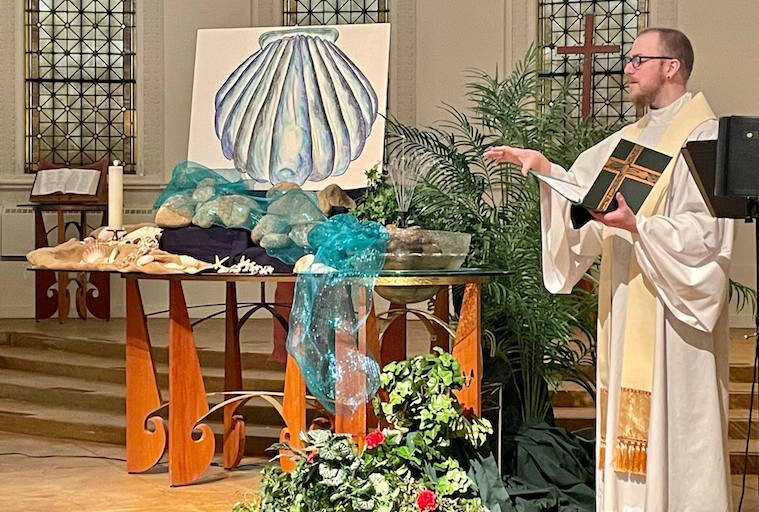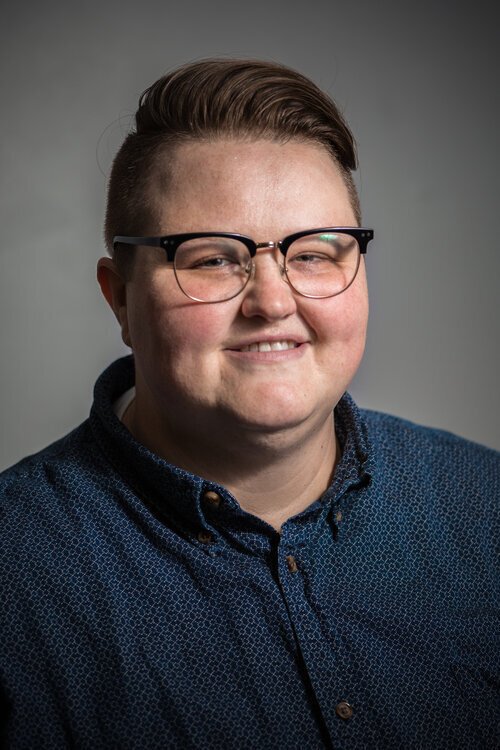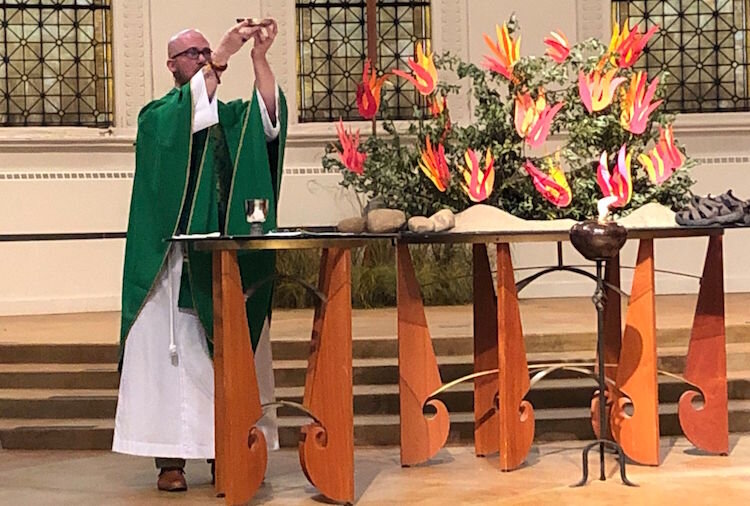When church goes online: Battle Creek congregation finds opportunity in pandemic imposed alternative
Churches across the country have dealt with the pandemic in different ways. At First Congregational Church in Battle Creek going online has created new ways to reach an audience they might never have otherwise encountered.
Editor’s note: This story is part of Southwest Michigan Second Wave’s On the Ground Battle Creek series.
Sunday church services at First Congregational Church are finding an international audience.
FCC Pastor Nathaniel Craddock says during an online service three weeks ago, individuals from Australia, Canada, and the United Kingdom were present, in addition to faces he’d never seen before. He says the average number of viewers hovers around 200 for each service and that folks from around the world have been joining at various times throughout the year and not necessarily at the same time.
Craddock says he thinks the latest surge may have been due in part to a workshop he’d hosted for others the day before the service and the role the Internet has played in enabling churches like his to offer online services as an alternative for in-person worship services during the pandemic.
“It’s certainly not been something that’s been a regular occurrence, but it is there and it is real,” Craddock says of the new attendees. “Often it’s friends inviting friends.”

FCC went to all-virtual Sunday services and a fellowship that follows those services on March 15, 2020, two days after Craddock began his pastoral duties with the church.
Jaimie Fales, FCC’s Administrator, says, “Nate got a whole two days under his belt and I met with him and said ‘this COVID thing is getting serious and I don’t know if we can have in-person services anymore.’”
She says she knew it wouldn’t be a tough sell with the church’s congregation who “by and large are far more likely to listen to scientists and the experts rather than false information. Our members, they value everybody’s safety and for them when it was clear that large gatherings would be dangerous for themselves and others. They knew they had to do what was safest and best. They’ve been receptive and understanding. They really want to be back in-person but they value life.”
While some churches have gone back to in-person worship services, Craddock says the decision to go completely virtual has yielded some unexpected and pleasant results, not the least of which is bringing in new people.
During that Saturday workshop in 2020 that included discussion about philosophical parallels between Christianity and Astrology, Craddock says he invited attendees to the Sunday worship services because that’s in his DNA as a pastor.
“I was in this really strange space where a pastor shows up and invites these people to church. I am really grateful to be involved in this congregation and I asked them to come check it out,” he says. “There’s always an area of vulnerability for people in the way they’re interacting. Attending a new church for the first time is one of the most awkward times and places in the universe. That’s been pretty common, but then you’ve got people joining a virtual coffee hour and that’s even a stranger space for a stranger to show up in. We do have folks joining the service from all over the planet.”

Fales says she thinks online services provide a safe space and a measure of anonymity for people who may be considering a new church or have never attended church before. For FCC the move to all online was not a stretch because they have been offering this option since 2019 as a replacement for radio broadcasts of services carried on WBCK.
When the all-virtual services began, she says about 75 people were present. “I’m sure that we’ve lost some who are regular attendees, but we’ve also gained people who might not have wanted to come to Battle Creek for a service or maybe didn’t want to check out an in-person service yet because going to a new church is a scary thing,” they say. “Where we see growth is with folks who maybe never even darkened the door of a church who are willing to try our church through this online format. We are seeing growth in new people checking out our services.”
Among the bigger challenges posed by the online format was the ability to offer music and singing that are among the least safe options in the time of a pandemic. FCC could no longer have people singing together live, but they found a solution through their organist whose daughter and granddaughter are able to sing together because they live in the same household.
“They have been singing for us during the services,” Fales says.
FCC also had to find a solution to continuing to serve congregants who lacked Internet access. They surveyed members and identified about five. The church was able to offer services on CD recordings that were delivered to those members. In the case of one individual who needed help, Craddock went to their home and showed them how to make the recordings work. For those who were having technological challenges, Fales says they spent “a lot of time on the phone teaching them how to access church services. We had to push through the frustration and learn new skills. As a faith community that’s what we had to do, push through.”
The upside, she says, is that it increased congregants’ motivation to embrace new technology and access things online.
Forever changing the way we worship
“I think when this pandemic started we all assumed it would be six weeks to three months tops and I don’t think any of us were prepared mentally for the reality now that we’ve been at this for almost a year and it’s caused us to strongly reevaluate what it means to be a congregation with a local presence and not be able to gather in-person,” Craddock says.
“One of the things that I had in mind was the idea that we are going to have to reevaluate what it means to be a church. At a certain level, it can be looked at as a beautiful opportunity. It’s never all good or all bad. But one of my main thoughts was that this is going to propel us to ask some really challenging questions about what it means to be a congregation of people actively engaged in making the world a better place and how we’re participating with God actively in the healing of the world.”
Americans don’t observe Sunday as a day of rest quite like they used to, according to an article published by Reach Right titled “14 Statistics You Need to know for 2020.” Reach Right provides services such as websites, marketing, and advertising to churches.
“Many have no choice but to work during regular services. This doesn’t mean they don’t want to attend church. Instead, they seek out churches that offer videos of their sermons and an active online community. The takeaway is Christians are changing. You may need to offer more than standard Sunday and Wednesday services to grow your church and increase tithing,” the article says.
Reach Right also cites something that has become common knowledge – fewer millennials attend church.
“Most of the decline you see in church growth and attendance comes as a direct result of millennials reaching adulthood and starting families. Since fewer of this generation attend church, churches are noticing less regular attendance and members. A Gallup Poll shows that only 42% of millennials attend church. This is the lowest generational percentage. Traditionalists come in at 68%, which is down from 77% in 2000. Even more generation X individuals attend church, though their rate has declined to 54% from 62%.
“One way to reach more millennials is by engaging them more. While some do prefer a more traditional church, many want to be more involved and become active participants in helping others and the local community. Churches who want to reach this demographic may also need to invest in newer technology and online strategies.”
Craddock is a product of a generation that has grown up with technology and is comfortable using it.
“For some folks, the Internet-based connections are not real,” he says. “As with many who grew up with Internet I know those relationships can be real and evolve. It’s interesting because there have been a lot of conversations, especially among progressive Christians, about the need to move away from the Church as being a knowledge download or lecture. There’s been a move away from that Sunday morning experience to the daily living of how we live our faith.
“There’s been a move toward allowing the Sunday gathering to be almost as a touchstone for the week where you’re able to connect with teaching, music, and each other and to be fed for the week. The fact that folks are making that primary point of contact is encouraging to me.”
When FCC was looking for a new pastor to fill the slot left by retiring Pastor Tom Ott, Fales says they wanted someone who could increase the church’s reach and could come to the faith community from a different vantage point.
“Pastor Craddock is an astrologer and comes from a pluralistic background. He connects with people who really wouldn’t feel comfortable in a church,” Fales says. “Increasingly, churches have been able to transition to that plurality and multi-faith approaches. Those are the churches that have been able to increase their reach. The Church is going to have to adapt and reimagine itself. This is in alignment with the way FCC has always operated.”
The weird kid
Craddock says he grew up as a weird kid and his friends were the ones who could be found hiding under school stairwells playing Dungeons and Dragons, the Goth kids. His interest in the metaphysical began after his father, a United Methodist minister, gave him a used copy of a book about astronomy. While these other interests are very much a part of who he is, he says he does not bring that part of himself into his role as a pastor.
“I haven’t felt a need to combine those two things in the liturgical setting,” Craddock says. “The context of the Christian liturgy is deeply rooted in our own cultural stories and bringing those stories to today’s situations. Where the two really manifest is that they both share deeply rooted philosophical traditions.”
The workshops he does are spaces where different conversations and explorations are welcome. “It’s a physical playground that makes space for the Divine,” he says.
Fales says FCC’s members value interfaith activities and dialog and were ready for someone like Craddock.
“There’s a way to develop unity among churches and a precedent for that in the digital age,” Craddock says. “It’s actually a really, really safe way to investigate congregations for folks who maybe weren’t quite sure about navigating all of the awkward Sunday visits. It’s a safe way to try a church.”
This is especially true if the person is LGBTQ or someone who looks or behaves in their embodiment in a way that may be viewed as a different way than others, he says.
Fales says virtual access also provides access to people who may not have a progressive Christian congregation in their area.
“I’ve had folks who have contacted me who don’t live in the area and want something new and want to approach Christianity from a progressive lens. What if they are able to hear about God, the gospel, and faith from a progressive perspective and do it from home?”
Craddock says, “I think there will always be a desire for an online option for people who are not able to access services or may want to access them in this way. Those of us doing this type of ministry think it’s vital for us to consider that digital congregants are just as much a part of the congregation. So much of people’s lives are happening now in a virtual setting.
“We’re not going to replace embodied gatherings because that is a fundamental facet to share the liturgy, but I don’t think online ministry is going anywhere. The pandemic has forced a lot of churches to finally take online ministry seriously.”
By its very nature, Craddock says the Internet is a chaotic sea of information.
“Out of chaos something new arises that is very good,” he says. “How do we continue to move forward with what God is calling to come out of the chaos? We need to pay attention for what is emerging.”
Fales says the pandemic and the politics of late have challenged FCC to be more creative in the ways they expand their reach.
“We are being jolted out of our complacency,” they say. “This has pushed us to take more risks and that’s what faith is, taking risks without knowing what the outcome is. If we align with our values and make decisions based on that, there will be rewards to it.”
















